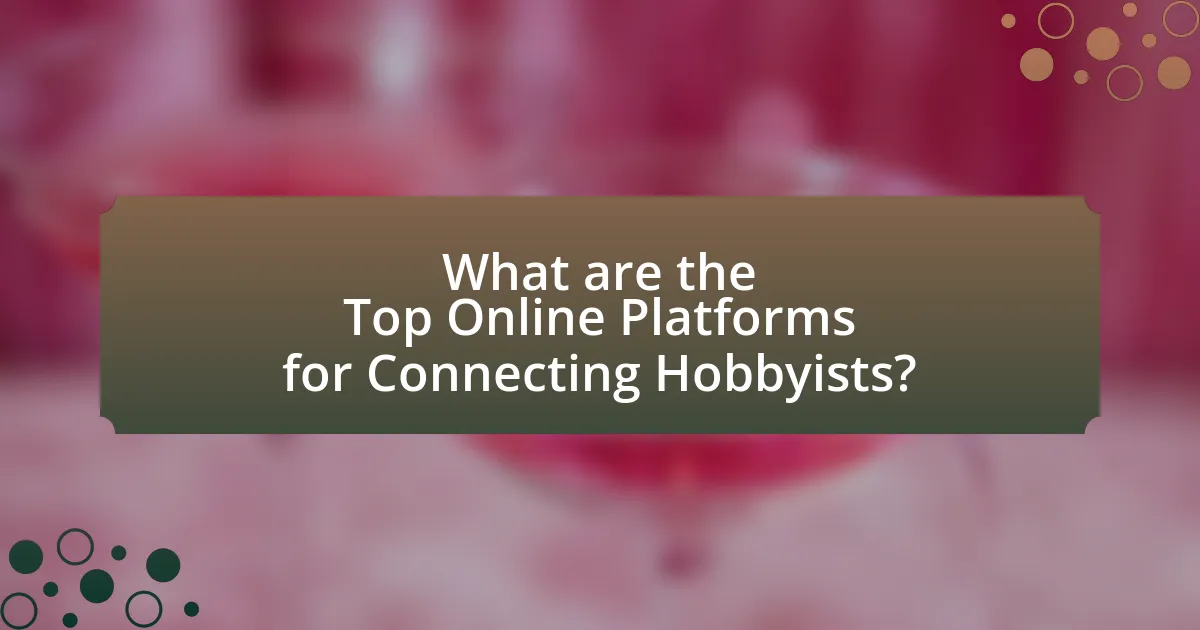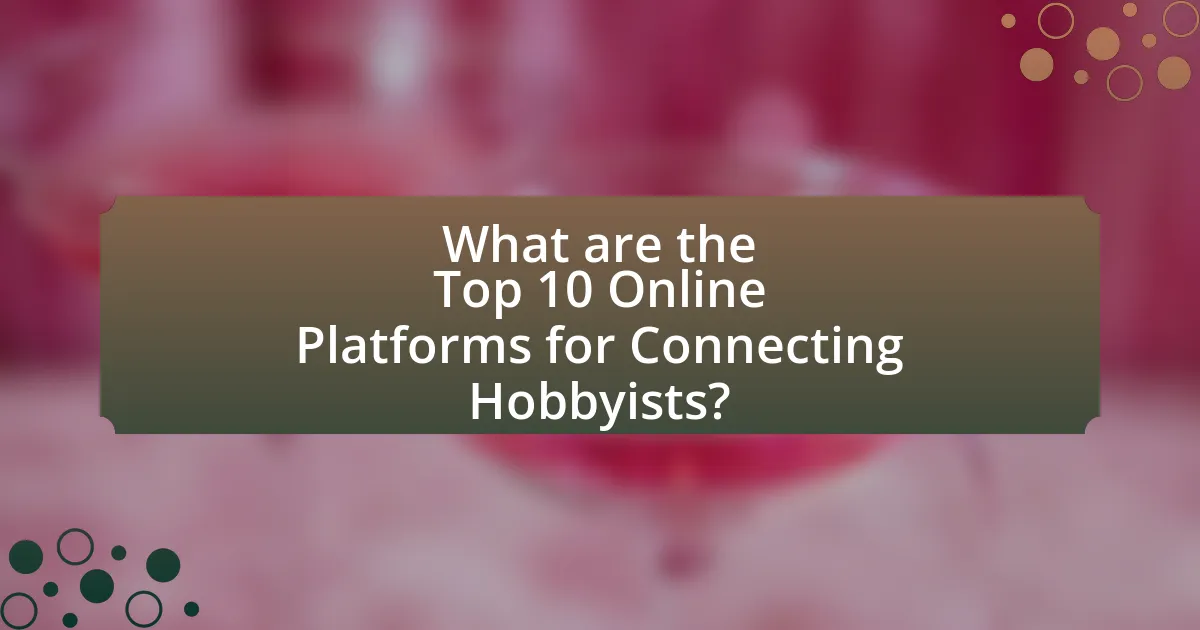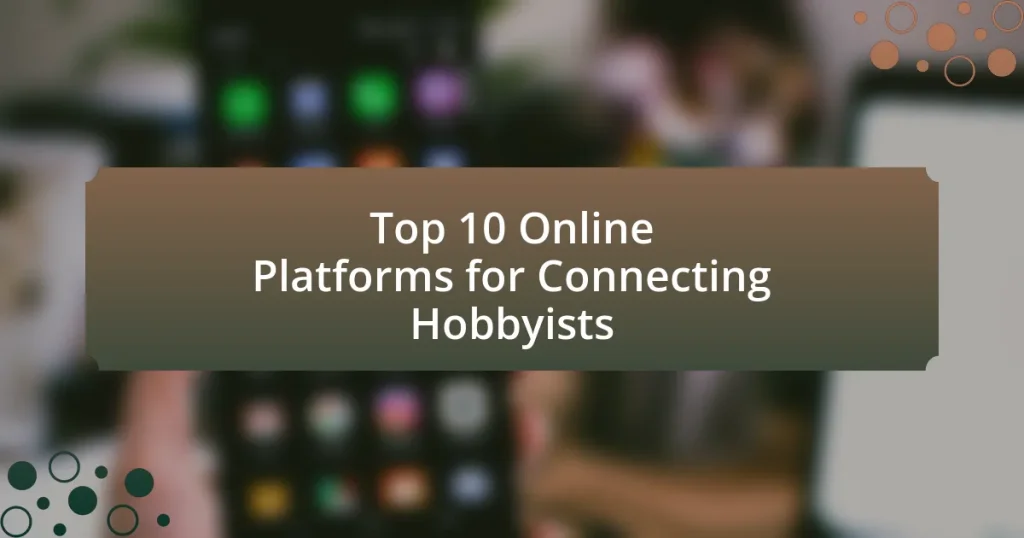The article focuses on the top 10 online platforms for connecting hobbyists, including Reddit, Facebook Groups, Meetup, Discord, and Pinterest. It explores how these platforms facilitate connections among hobbyists through community forums, real-time messaging, and event organization tools, enhancing user interaction and collaboration. Additionally, the article discusses the unique features of each platform, the importance of online connections for skill development, and best practices for engaging with communities. It also highlights how user interfaces and mobile accessibility impact user experience, making it easier for hobbyists to connect and share their interests.

What are the Top Online Platforms for Connecting Hobbyists?
The top online platforms for connecting hobbyists include Reddit, Facebook Groups, Meetup, Discord, and Pinterest. Reddit hosts numerous niche communities where hobbyists can share experiences and advice, while Facebook Groups allows users to join specific interest-based groups for discussions and events. Meetup facilitates in-person gatherings based on shared hobbies, fostering community connections. Discord provides real-time communication through servers dedicated to various interests, enabling collaboration and interaction. Pinterest serves as a visual discovery tool where hobbyists can find inspiration and share their projects. These platforms collectively support diverse hobbies and facilitate connections among enthusiasts.
How do these platforms facilitate connections among hobbyists?
These platforms facilitate connections among hobbyists by providing dedicated spaces for interaction, sharing, and collaboration. They enable users to join communities based on specific interests, allowing for targeted discussions and exchanges of ideas. For instance, platforms like Reddit and Facebook Groups offer forums where hobbyists can post questions, share experiences, and showcase their projects, fostering a sense of belonging. Additionally, features such as messaging, forums, and event organization tools enhance real-time communication and collaboration among users, making it easier for hobbyists to connect and engage with one another.
What features do these platforms offer to enhance user interaction?
These platforms enhance user interaction through features such as community forums, real-time messaging, user-generated content, and event scheduling. Community forums allow users to engage in discussions, share experiences, and seek advice, fostering a sense of belonging. Real-time messaging facilitates instant communication, enabling users to connect and collaborate efficiently. User-generated content, such as blogs and tutorials, encourages creativity and knowledge sharing among hobbyists. Event scheduling features help organize meetups and workshops, promoting offline interactions. These functionalities collectively create a vibrant ecosystem that supports active participation and collaboration among users.
How do these platforms cater to different types of hobbies?
These platforms cater to different types of hobbies by offering specialized features and communities tailored to specific interests. For example, platforms like Meetup facilitate local gatherings for hobbyists, allowing users to find groups based on shared activities such as hiking, photography, or crafting. Similarly, platforms like Ravelry focus on knitting and crochet enthusiasts, providing forums, patterns, and project tracking tools specifically for those crafts. Additionally, platforms like Skillshare and Udemy offer courses across a wide range of hobbies, from cooking to coding, enabling users to learn and enhance their skills in their chosen areas. This targeted approach ensures that hobbyists can connect with like-minded individuals and access resources that directly support their interests.
Why is it important for hobbyists to connect online?
It is important for hobbyists to connect online because it facilitates knowledge sharing, community building, and access to resources. Online platforms enable hobbyists to exchange ideas, seek advice, and collaborate on projects, which enhances their skills and enjoyment of their hobbies. For instance, a survey by the Pew Research Center found that 70% of hobbyists reported that online communities helped them improve their skills and knowledge in their respective interests. This connection fosters a sense of belonging and support, which is crucial for personal growth and motivation in pursuing hobbies.
What benefits do hobbyists gain from online connections?
Hobbyists gain several benefits from online connections, including access to a wider community, sharing of knowledge, and opportunities for collaboration. These connections allow hobbyists to engage with like-minded individuals, enhancing their skills and experiences through shared resources and advice. For instance, platforms like Reddit and Facebook groups enable hobbyists to ask questions, receive feedback, and participate in discussions that can lead to improved techniques and new ideas. Additionally, online connections facilitate collaboration on projects, allowing hobbyists to combine their talents and create more complex works than they could individually. This collaborative environment fosters creativity and innovation, ultimately enriching the hobbyist experience.
How does online interaction compare to in-person connections for hobbyists?
Online interaction offers greater accessibility and diversity compared to in-person connections for hobbyists. While in-person interactions allow for immediate feedback and a tangible sense of community, online platforms enable hobbyists to connect with a global audience, facilitating the exchange of ideas and resources that may not be available locally. According to a study by Pew Research Center, 72% of adults use social media, which highlights the prevalence of online platforms in fostering connections among hobbyists. This accessibility can lead to increased collaboration and innovation within various hobbies, as individuals can share experiences and knowledge across geographical boundaries.

What are the Key Features of the Top Platforms?
The key features of the top platforms for connecting hobbyists include user-friendly interfaces, community engagement tools, diverse interest categories, and robust search functionalities. User-friendly interfaces facilitate easy navigation, allowing hobbyists to quickly find relevant content and connect with others. Community engagement tools, such as forums, chat options, and event calendars, foster interaction among users, enhancing the social aspect of hobbies. Diverse interest categories ensure that a wide range of hobbies is represented, catering to various user preferences. Robust search functionalities enable users to efficiently locate specific groups, discussions, or resources related to their interests. These features collectively enhance the user experience and promote active participation within the hobbyist community.
How do user interfaces impact the experience on these platforms?
User interfaces significantly impact the experience on online platforms for connecting hobbyists by influencing usability, engagement, and satisfaction. A well-designed user interface enhances navigation, making it easier for users to find relevant content and connect with others who share similar interests. For instance, platforms with intuitive layouts and clear calls to action can lead to higher user retention rates; research indicates that 94% of first impressions relate to design, highlighting the importance of visual appeal in user engagement. Additionally, user interfaces that incorporate feedback mechanisms and personalization features can foster a sense of community, encouraging users to participate more actively. Therefore, the effectiveness of user interfaces directly correlates with the overall user experience on these platforms.
What design elements make a platform user-friendly for hobbyists?
A platform is user-friendly for hobbyists when it incorporates intuitive navigation, clear categorization, and responsive design. Intuitive navigation allows users to easily find relevant content and features, enhancing their overall experience. Clear categorization helps hobbyists quickly locate specific interests or communities, reducing frustration and time spent searching. Responsive design ensures that the platform functions well across various devices, accommodating hobbyists who may access it from smartphones, tablets, or desktops. These design elements collectively contribute to a seamless user experience, making it easier for hobbyists to engage with the platform and connect with others who share their interests.
How does mobile accessibility affect user engagement?
Mobile accessibility significantly enhances user engagement by allowing users to interact with platforms anytime and anywhere. Research indicates that 57% of users will not recommend a business with a poorly designed mobile site, highlighting the importance of mobile-friendly interfaces in retaining user interest. Furthermore, platforms optimized for mobile access experience higher user retention rates, as users are more likely to engage with content that is easily accessible on their devices. This correlation between mobile accessibility and user engagement is supported by data showing that mobile users spend 87% of their time on apps, emphasizing the need for seamless mobile experiences to foster active participation.
What types of communities can be found on these platforms?
Various types of communities can be found on online platforms for connecting hobbyists, including crafting, gaming, photography, and cooking communities. These platforms facilitate interaction among individuals who share specific interests, allowing them to exchange ideas, showcase their work, and collaborate on projects. For instance, crafting communities often focus on DIY projects and tutorials, while gaming communities may center around multiplayer games and strategy discussions. Additionally, photography communities provide spaces for sharing images and receiving feedback, and cooking communities often share recipes and cooking tips. Each community thrives on user-generated content and active participation, fostering a sense of belonging among members.
How do niche communities thrive on general platforms?
Niche communities thrive on general platforms by leveraging shared interests and utilizing the platform’s broad reach to connect with like-minded individuals. These communities often create dedicated spaces, such as forums or groups, where members can engage in discussions, share resources, and organize events related to their specific interests. For instance, platforms like Reddit and Facebook allow niche groups to flourish by providing tools for content sharing and interaction, which can lead to increased visibility and engagement. According to a study by Pew Research Center, 70% of users engage with online communities that reflect their hobbies or interests, demonstrating the effectiveness of general platforms in fostering niche interactions.
What role do forums and discussion boards play in community building?
Forums and discussion boards serve as essential platforms for community building by facilitating communication and interaction among members with shared interests. These platforms enable users to exchange ideas, seek advice, and share experiences, fostering a sense of belonging and connection. Research indicates that active participation in online forums can lead to increased social support and engagement, which are critical components of community cohesion. For instance, a study published in the Journal of Computer-Mediated Communication found that users who engage in discussions on forums report higher levels of community satisfaction and stronger interpersonal relationships.

What are the Top 10 Online Platforms for Connecting Hobbyists?
The top 10 online platforms for connecting hobbyists are Reddit, Facebook Groups, Meetup, Discord, Pinterest, Instagram, YouTube, Ravelry, Skillshare, and Etsy. These platforms facilitate interaction among individuals with shared interests, allowing them to exchange ideas, showcase their work, and collaborate on projects. For instance, Reddit hosts numerous niche communities where hobbyists can engage in discussions, while Facebook Groups provide a space for members to share resources and organize events. Meetup is specifically designed for in-person gatherings, enhancing community building among hobbyists. Discord offers real-time communication through voice and text channels, making it popular among gamers and creators. Pinterest and Instagram serve as visual platforms for inspiration and sharing creative projects. YouTube provides tutorials and showcases for various hobbies, while Ravelry caters specifically to knitting and crochet enthusiasts. Skillshare offers classes for skill development, and Etsy allows hobbyists to sell their handmade goods, connecting them with a broader audience.
What makes each platform unique in connecting hobbyists?
Each platform connects hobbyists uniquely through distinct features and community engagement strategies. For example, Reddit fosters niche communities through subreddits, allowing users to share specific interests and experiences, while Facebook Groups enable real-time interaction and event organization among members with similar hobbies. Instagram emphasizes visual storytelling, allowing hobbyists to showcase their projects and connect through hashtags, whereas Discord provides real-time voice and text communication, enhancing collaboration among gamers and creators. Additionally, Meetup focuses on in-person gatherings, facilitating local connections among hobbyists, while Pinterest serves as a visual discovery tool, inspiring users with ideas and tutorials. Each platform’s unique approach to community building and content sharing caters to different aspects of hobbyist engagement, making them effective in connecting individuals with shared passions.
How does Platform A cater specifically to craft enthusiasts?
Platform A caters specifically to craft enthusiasts by offering a dedicated marketplace for handmade goods, allowing artisans to showcase and sell their creations directly to consumers. This platform features user-friendly tools for listing products, managing inventory, and processing payments, which simplifies the selling process for crafters. Additionally, Platform A provides a vibrant community forum where craft enthusiasts can share ideas, seek advice, and collaborate on projects, fostering a sense of belonging and support among users. The platform also hosts workshops and tutorials tailored to various crafting techniques, enhancing skill development and engagement within the craft community.
What features does Platform B offer for gamers?
Platform B offers gamers features such as multiplayer gaming capabilities, a robust matchmaking system, and integrated voice chat. These features enhance the gaming experience by allowing players to connect and compete with others seamlessly. The multiplayer capabilities enable users to join games with friends or find new opponents, while the matchmaking system ensures balanced gameplay by pairing players of similar skill levels. Additionally, integrated voice chat facilitates real-time communication, improving teamwork and strategy during gameplay.
How do user reviews and ratings influence platform choice?
User reviews and ratings significantly influence platform choice by shaping potential users’ perceptions and trust in the platform. Research indicates that 84% of people trust online reviews as much as personal recommendations, highlighting their impact on decision-making. Positive reviews can enhance a platform’s credibility, while negative ratings can deter users, leading them to choose alternative options. Additionally, platforms with higher average ratings tend to attract more users, as evidenced by a study from BrightLocal, which found that 91% of consumers read online reviews regularly. This correlation between user feedback and platform selection underscores the importance of reviews in the competitive landscape of online platforms for hobbyists.
What common themes emerge from user feedback on these platforms?
Common themes from user feedback on online platforms for connecting hobbyists include community engagement, ease of use, and content variety. Users frequently express appreciation for the sense of belonging and support found within these communities, highlighting how interactions foster friendships and collaboration. Additionally, feedback often emphasizes the importance of user-friendly interfaces, which enhance the overall experience by making navigation simple and intuitive. Lastly, users value the diversity of content available, as it allows them to explore various interests and hobbies, contributing to a richer experience on these platforms.
How can potential users assess the credibility of reviews?
Potential users can assess the credibility of reviews by examining the reviewer’s profile, checking for verified purchases, and analyzing the language used in the reviews. Reviewers with complete profiles and a history of verified purchases are more likely to provide trustworthy insights. Additionally, credible reviews often contain specific details about the product or service, rather than vague statements. Research indicates that 79% of consumers trust online reviews as much as personal recommendations, highlighting the importance of evaluating the source and content of reviews for informed decision-making.
What tips can help hobbyists choose the right platform for their needs?
Hobbyists should evaluate their specific interests and goals to choose the right platform for their needs. Identifying whether they seek community engagement, resources, or project collaboration is crucial. For instance, platforms like Reddit cater to diverse interests with community forums, while specialized sites like Instructables focus on DIY projects and tutorials. Additionally, assessing user interface, accessibility, and the level of activity within the community can significantly impact the experience. Research indicates that platforms with active user bases and robust support features enhance user satisfaction and engagement, making them more suitable for hobbyists.
How should hobbyists evaluate their specific interests when selecting a platform?
Hobbyists should evaluate their specific interests by identifying the activities they are passionate about and matching those interests with the features and community of the platform. For instance, if a hobbyist enjoys photography, they should look for platforms that offer robust photo-sharing capabilities, editing tools, and an active community of photographers. Research indicates that platforms with specialized features attract users who are more engaged and satisfied; for example, a study by the Pew Research Center found that 69% of users prefer platforms that cater specifically to their interests. Therefore, aligning personal interests with platform offerings enhances user experience and fosters community engagement.
What are the best practices for engaging with communities on these platforms?
The best practices for engaging with communities on online platforms include active participation, respectful communication, and providing valuable content. Active participation involves regularly contributing to discussions, answering questions, and sharing experiences, which fosters a sense of belonging and encourages others to engage. Respectful communication is crucial; members should listen to differing opinions and respond thoughtfully, creating a welcoming environment. Providing valuable content, such as tutorials, tips, or resources, enhances the community’s knowledge and keeps members returning for more. These practices are supported by research indicating that communities with high engagement levels see increased member satisfaction and retention.
